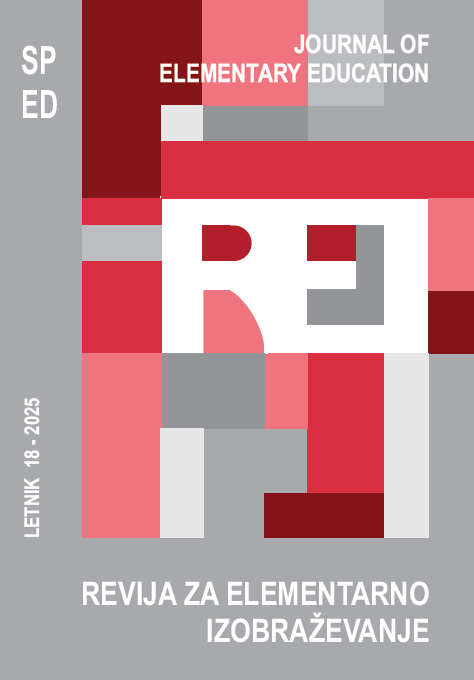Ali učiteljev interes vpliva na pogostost izvajanja pouka izven učilnice pri začetnem družboslovju?
DOI:
https://doi.org/10.18690/rei.5398Ključne besede:
osnovna šola, družboslovje, izkustveno učenje, pouk izven učilnice, konvergentni model kombiniranega raziskovanja.Povzetek
V članku so predstavljene ugotovitve raziskave, katere namen je bil ugotoviti, ali učiteljev interes in drugi dejavniki vplivajo na uveljavljanje pouka izven učilnice pri začetnem družboslovju v osnovnošolskem izobraževanju. Uporabljen je bil konvergentni model kombiniranega raziskovalnega pristopa. Rezultati kažejo, da se pouk izven učilnice pri začetnem družboslovju v praksi izvaja manj pogosto, kot bi bilo za pričakovati glede na didaktične smernice poučevanja začetnega družboslovja, saj večina učiteljev izvaja pouk izven učilnice le enkrat na mesec ali redkeje. Učiteljev osebni interes se je izkazal kot pomemben dejavnik, ki vpliva na pogostost izvajanja pouka izven učilnice.
Prenosi
Literatura
Acar, H. (2014). Learning Environments for Children in Outdoor Spaces. Procedia - Social and Behavioral Sciences, 141, 846-853. https://doi.org/https://doi.org/10.1016/j.sbspro.2014.05.147
Allison, P. (2020). Influences on Anglophone approaches to outdoor education. In J. Parry and P. Allison (eds.), Experiential Learning and Outdoor Education (pp. 28-36). Routledge.
Beames, S., Higgins, P., and Nicol, R. (2012). Learning Outside the Classroom. Theory and Guidelines for Practice. Taylor & Francis.
Borsos, É., Banos-González, I., Boric, E., Lyngved Staberg, R., and Fekete, A. B. (2022). Trainee teachers’ perceptions of outdoor education. Environmental Education Research, 1-20. https://doi.org/10.1080/13504622.2022.2031901
Budnar, M., Kerin, M., Umek, M., Raztresen, M., and Mirt, G. (2011). Učni načrt. Osnovna šola. Družba. Ministrstvo za šolstvo in šport. Zavod Republike Slovenije za šolstvo.
Cengelci, T. (2013). Social Studies Teacher' Views on Learning Outside the Classroom. Educational Sciences: Theory and Practice, 13(3).
Chawla, L. (2015). Benefits of Nature Contact for Children. Journal of Planning Literature, 30(4), 433-452. https://doi.org/10.1177/0885412215595441
Coates, J. K., and Pimlott-Wilson, H. (2019). Learning while playing: Children's Forest School experiences in the UK [Article]. British Educational Research Journal, 45(1), 21-40. https://doi.org/10.1002/berj.3491
Creswell, J. W., and Plano Clark, V. L. (2017). Designing and conducting mixed methods research (3 ed.). Sage Publications.
Djonko-Moore, C. M., and Joseph, N. M. (2016). Out of the Classroom and Into the City. SAGE Open, 6(2), 215824401664964. https://doi.org/10.1177/2158244016649648
Edwards-Jones, A., Waite, S., and Passy, R. (2018). Falling into LINE: school strategies for overcoming challenges associated with learning in natural environments (LINE). Education 3-13, 46(1), 49-63. https://doi.org/10.1080/03004279.2016.1176066
Ellis, A. K. (2007). Teaching & Learning Elementary Social Studies. Pearson Education Inc.
Flick, U. (2018). Designing qualitative research. SAGE.
Gibbs, G. R. (2018). Analyzing qualitative data. SAGE.
Gosenar, T., and Cencič, M. (2019). Učitelji razrednega pouka o pouku zunaj šole. Sodobna pedagogika, 70(2), 52-69.
Grant, S. G., and VanSledright, B. (2021). Elementary Social Studies. Constructing a Powerful Approach to Teaching and Learning. Routledge.
Jančič Hegediš, P., and Hus, V. (2017). Učitelji in konstruktivistični pristop pri pouku družbe. Pedagoška obzorja: časopis za didaktiko in metodiko, 32(3/4).
Jančič Hegediš, P., and Hus, V. (2019). Representation of teaching strategies based on constructivism in social studies. International Journal of Innovation and Learning, 25(1), 64-77. doi:10.1504/IJIL.2019.096535
Jirasek, I., and Turčova, I. (2020). Experiential pedagogy in the Czech Republic. In J. Parry and P. Allison (Eds.), Experiential Learning and Outdoor Education (pp. 8-18). Routledge.
Korban Črnjavič, M., and Hus, V. (2009). Stališče učiteljev do izkustvenega učenja in poučevanja predmeta spoznavanje okolja. Journal of Elementary Education, 2(1), 73–81. https://journ–als.um.si/index.php/education/article/view/235
Korošec, U., Ambrožič Dolinšek, J., and Hus, V. (2009). Pomen terenskega dela za bodoče učitelje razrednega pouka. Journal of Elementary Education, 2(1), 49–58. https://journals.um.si/index–.php/education/article/view/233
Kolar, M., Krnel, D., and Velkavrh, A. (2011). Učni načrt. Program osnovna šola. Spoznavanje okolja.
Korban Črnjavič, M. (2016). Refleksija učiteljev razrednega pouka o izvajanju izkušenjskega učenja in poučevanja izven učilnice pri pouku spoznavanja okolja. Pedagoška fakulteta Univerze v Mariboru.
Kuo, M., Barnes, M., and Jordan, C. (2019). Do Experiences With Nature Promote Learning? Converging Evidence of a Cause-and-Effect Relationship [Mini Review]. Frontiers in Psychology, 10. https://doi.org/10.3389/fpsyg.2019.00305
Mann, J., Gray, T., Truong, S., Brymer, E., Passy, R., Ho, S., Sahlberg, P., Ward, K., Bentsen, P., Curry, C., and Cowper, R. (2022). Getting Out of the Classroom and Into Nature: A Systematic Review of Nature-Specific Outdoor Learning on School Children's Learning and Development [Systematic Review]. Frontiers in Public Health, 10. https://doi.o–rg/10.3389/fpubh.2022.877058
Mannion, G., Fenwick, A., and Lynch, J. (2013). Place-responsive pedagogy: learning from teachers’ experiences of excursions in nature. Environmental Education Research, 19(6), 792-809. https://doi.org/10.1080/13504622.2012.749980
Maxim, G. W. (2018). Dynamic Social Studies (11th ed.). Pearson Education, Inc.
Novak, L., Skribe Dimec, D., Krajnc Urbanija, P., Legvart, P., and Trampuž, M. (2020). Poročilo o analizi učnega načrta za spoznavanje okolja. https://www.zrss.si/gradiva/Analiza-UN/26_poznava–nje%20okolja_.pdf
Nundy, S., Dillon, J., and Dowd, P. (2020). Improving and encouranging teacher confidence in out-of-classroom learning: the impact of the Hampshire Trailblazer project on 3-13 curriculum practitioners. In S. Waite (ed.), Outdoor Learning Research. Insight into forms and functions (pp. 148-160). Routledge.
Patchen, A. K., Rakow, D. A., Wells, N. M., Hillson, S., and Meredith, G. R. (2024). Barriers to children’s outdoor time: teachers’ and principals’ experiences in elementary schools. Environmental Education Research, 30(1), 16-36. https://doi.org/10.1080/13504622.2–022.2099530
Porter, H. (2018). Educating Outside. Bloomsbury. Povzetek poročil skupin za analizo učnih načrtov v osnovni šoli in gimnaziji. (2021). https://www.zrss.–si/pdf/povzetek_porocil_skupin_za_analizo_–UN.pdf
Pšunder, M. (2004). Disciplina v sodobni šoli. Zavod Republike Slovenije za šolstvo.
Quay, J. (2020). John Dewey's conceptualisation of experience. In J. Parry and P. Allison (eds.), Experiential Learning and Outdoor Education (pp. 71-90). Routledge.
Sedgwick, F. (2012). Lerning Outside the Primary Classroom. Routledge.
Seefeldt, C., and Galper, A. (2005). Active Experience for Active Children. Social Studies. Pearson.
Šebjanič, E., and Skribe Dimec, D. (2019). Primeri dobre prakse pouka na prostem v Sloveniji in tujini. Sodobna pedagogika, 70 (136)(2), 70–85.
Štemberger, V. (2012). Šolsko okolje kot učno okolje ali pouk zunaj. 84-90. VIR?
Waite, S. (2011). Teaching and learning outside the classroom: personal values, alternative pedagogies and standards. Education 3-13, 39(1), 65–82. https://doi.org/10.1080/03004270903206141
White, J. (2020). Playing and Learning Outdoors (3rd ed.). Routledge Taylor & Francis Group.
Prenosi
Objavljeno
Številka
Rubrika
Licenca
Avtorske pravice (c) 2025 Polona Jančič Hegediš

To delo je licencirano pod Creative Commons Priznanje avtorstva 4.0 mednarodno licenco.
